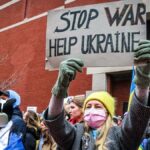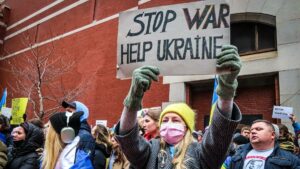I’m a longtime NJ peace activist — and I support Ukraine

 I came of political age as an opponent of the U.S. war in Vietnam. Since then, I have protested against U.S. wars in Central America, Israel’s wars against Palestinians, the war in Afghanistan and the invasion of Iraq. But though I am an anti-war activist, I am not an absolute pacifist.
I came of political age as an opponent of the U.S. war in Vietnam. Since then, I have protested against U.S. wars in Central America, Israel’s wars against Palestinians, the war in Afghanistan and the invasion of Iraq. But though I am an anti-war activist, I am not an absolute pacifist.
I believe that there are times — far fewer than the generals and the politicians claim — when war is justified as a way to defend people from a ruthless enemy. I consider the war against Hitler and the U.S. Civil War to have been such wars. I don’t approve of all that was done in pursuit of victory (like the bombings of Dresden or Hiroshima), but I am convinced it was right to take up arms in these cases.
In the current war between Russia and Ukraine, though I am critical of many of Kyiv’s policies, I think Russia’s invasion was an immoral and illegal act of aggression and that the Ukrainian people have the right of self-defense. And since the right of self-defense is of no value without the means to carry it out, I support Ukraine receiving arms from whatever source, including from the U.S. government.
Some of my peace movement friends say that the provision of weapons keeps the war going. Indeed, without U.S. weapons Ukraine would have been defeated long ago. But a defeated Ukraine wouldn’t mean a joyous peace. It would mean that a people would have lost their independence and be forced to live under the iron heel of a regime responsible for horrible massacres. Throughout history, aggressors have always been in favor of peace — as long as their victims surrender on their terms.
Wouldn’t it be better to spend money on human needs instead of war? Of course, but survival in the case of a brutal invasion is a human need; in fact it is the human need without which no other needs can be met. Nor does support for Ukraine mean we have to cut social spending. If we ended the tremendous tax breaks for the rich, there would be more than enough money to address pressing social problems along with helping Ukraine defend itself.
The peace movement has long warned of the dangers of nuclear war. Recently some have argued that we need to withdraw support from Ukraine because the conflict might escalate to the use of nuclear weapons. The nuclear threats from Russia have certainly been frightening and reckless. But giving in to Vladimir Putin’s nuclear extortion will not minimize the risks. If nuclear threats succeed in giving bullies what they want, won’t we see more such threats in the future and many more countries rushing to get nuclear weapons of their own? That would be an even more dangerous world.
To be sure, the dangers of escalation need to be taken seriously. This was why it made sense to oppose President Volodymyr Zelenskyy’s request for a no-fly zone, which risked direct U.S.-Russian confrontation. And it still makes sense to refrain from giving Ukraine the means to attack Russian territory.
As a peace activist, do I support a ceasefire? As a first step toward an agreed withdrawal of Russian troops, of course. But what about as a way to freeze the lines where they are today, with Moscow in control of 18% of Ukrainian territory, and from which lines Russia might decide to invade again once it has rebuilt its decimated forces? I don’t urge Ukrainians to reject such a ceasefire — only they can decide when the horrible costs they have been paying are too much. But nor do I believe that they should be pressured into accepting such a settlement.
During the Vietnam war, I knew that the conflict would have to end with negotiations, but I called for “Out Now,” because in my view the United States had no right to be there. In the same way, while recognizing that the Ukrainian conflict will inevitably end with negotiations, and hoping that Western arms will allow Kyiv to achieve the best possible peace terms, I call for Russian troops to get “Out Now.” My deepest hope is that peace arrives as soon as possible, but a peace with justice.
Stephen R. Shalom is professor emeritus of political science at William Paterson University.
[This article first appeared on NorthJersey.com.]